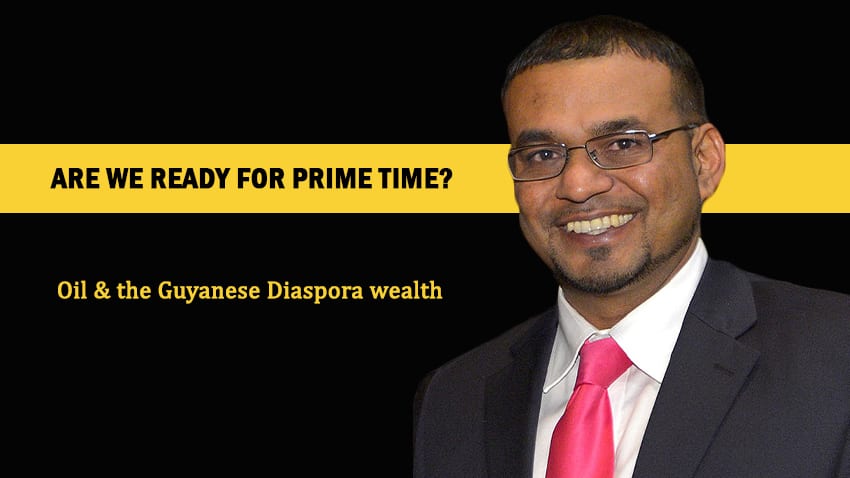In response to last week’s column, I was asked how can we mitigate against non-nationals grabbing up most of the potential opportunities of oil and gas, in light of existing national limitations. There are several options! There is one staring us in the face – harnessing the Guyanese diaspora.
The estimated population of the first generation of the Guyanese diaspora is close to one million, larger than our current population of 756,000. If one takes into account the second generation of the Guyanese diaspora, we might be looking at another 300,000. A look at our census data on the migration trend for the past 50 years is startling as it is discomforting. For decades, people voted with their feet in droves no matter which party was in Government. Today, a fair number of them are well educated, financially resourceful and exposed to a first world, modern business milieu.
In attempting to tap the diaspora, some might rightly argue that persuading them to return will be an uphill battle given our existing domestic challenges ranging from a risky, fragile security environment to concerns about political instability.
I am not unaware of the previous efforts to lure our nationals back home. Successive governments, past and current, have deployed the Ministry of Foreign Affairs (http://guydproject.minfor.gov.gy) to roll out various initiatives to get our nationals back in the homeland. The results, so far, have been mixed.
I strongly believe that the potential of the oil and gas (O&G) sector can be a momentous turning point to get our nationals, scattered in the diaspora, to look at and act more positively on Guyana.
I recall the vigorous debates on the Guyana migration trend and the ‘push’ and ‘pull’ factors in my University demographic classes with the knowledgeable lecturer and former Minister of Education, the late Derek Bernard. Various theories were proffered on how we can arrest the emptying out of our country, notwithstanding which party was in Government. The conclusion: our weak economic footing and historical divisive society are strong push factors.
Encouragingly, O&G can immediately impact the economic vulnerabilities, if managed well, and hopefully inspires all stakeholders to undertake the fundamental shakeup of our political governance infrastructure. The O&G sector’s contribution to economic progress can be that game changing pull factor for the diaspora and, at the same time, stem the wave of outward migration.
The O&G sector has built-in demands for a range of specialized services directly, a plethora of spin–off economic activities, and, in the long-term, a new subsector of downstream activities (manufacturing and processing of petroleum and petrochemical products). The promise of these activities can be a catalyst for thousands with skills and capital to return.
Our diaspora must not be spectators while other nationals flock our country. It is time we instigate a similar rush. I know some will be quick to retort that they will not come given certain serious constraints. And swiftly I will rebut and point to several countries (Israel, China, India & Mexico) where the diaspora returned and helped change the fortunes and correct some of the same weaknesses that serve as deterrents. It’s like a chicken and egg scenario of which one came first: should the diaspora wait for ideal conditions to exist or return and help create the ideal conditions they demand? There is no time for procrastination. Others are busy scouting for opportunities notwithstanding the myriad problems in Guyana.
With a small population and a miniature internal market, the anticipated boom to come from O&G requires a larger population to service this expanding sector and to take up the many new opportunities. It’s time we arouse the interest of our diaspora as we get very quickly to the March 2020 oil production timetable.
I wish to posit a few, small steps to aid existing efforts targeting the diaspora:
- Look at informing the diaspora continuously on opportunities in O&G. The ICT platforms can be very effective.
- Target the second generation of the Guyanese diaspora, who are less connected to the country. Even look at special interventions for them to access Guyanese passports (as legally provided for) or, as India has done, issue a person of origin card.
- For the planned National Petroleum Company, special bonds or investment instruments be issued targeting the diaspora investment dollars.
- The Bank of Guyana should work with local commercial banks for them to set up branches in the diaspora. The Chinese and Indians have done this with great success to tap their diaspora capital.
- O&G companies should be encouraged to be aggressive in finding their required skills in the Guyanese diaspora, if these are not available in country. This effort can be assisted via the Ministry of Foreign Affairs’ diaspora unit.
- Similar to an overseas-based Guyanese investor’s impressive housing development scheme – Windsor Estate Guyana – others should be encouraged and incentivized to create communities and settlements based on commercial demands.
The arrival of oil will complement our traditional economic activities, and there will be much scope and need for the diaspora to be part of the anticipated transformation with the right policies and focus. If we are serious about the mantra of Guyana for Guyanese first, then we should excite our diaspora into quick action.
(The writer Robert M. Persaud (robertmpersaud.com) is the Former Minister of Natural Resources and the Environment, and now the Managing Consultant of Georgetown-based Ipower Consultancy. Send feedback to:[email protected])



